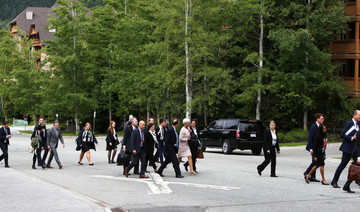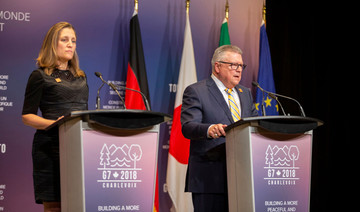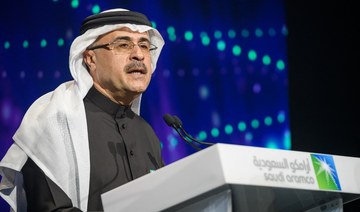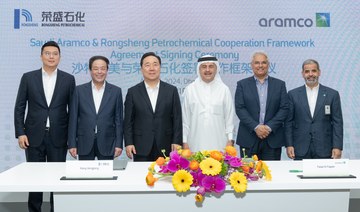LA MALBAIE, Canada: The Group of Seven leaders on Saturday failed to heal a tariff dispute that has pushed them to the brink of trade war, as Donald Trump quit their summit early warning Canada, Japan and Europe that “the gig is up.”
Trump had come to Quebec insisting on his long-standing claim that America has been exploited for too long by existing trade arrangements — and he was met by counterparts equally determined to protect the “rules-based” international system.
The US president left on Saturday for Singapore and a historic summit with North Korea’s Kim Jong Un, claiming he had made progress convincing the other G7 leaders that trade between their countries must be better balanced or halt altogether.
“The United States has been taken advantage of for decades and decades,” Trump said at a press conference on the second day of the two-day summit.
“I guess they’re going to go back to the drawing board and check it out, right?” he said, warning that if his fellow six leaders make good on their threats to take retaliatory measures, they could find themselves shut out of American markets.
European officials said Trump had opposed language in the draft final summit communique on the need to bolster the World Trade Organization and multilateral oversight of commerce, but that this commitment would survive.
“For us, it was important to have a commitment to rules-based trade,” Germany’s Chancellor Angela Merkel said.
“On the issue of trade, we have been able to agree on important questions to us,” she added, stressing that it was “important to have a commitment to rules-based trade.”
Merkel acknowledged, however, that major differences remained between the US and its partners in the group which includes the world’s seven most industrialized economies.
“This is not a detailed solution to our problems. The differences in opinion have not been taken off the table.”
The German leader said there was “a common conviction” about the need for changes to the WTO, although it was not immediately clear if there would a clear call for reform in the final statement.
As the leaders met, Trump played a wild card, suggesting that rather than both sides boosting retaliatory tariffs — as he has just done on steel and aluminum — they could declare for entirely free trade in the G7 zone.
“No tariffs, no barriers. That’s the way it should be. And no subsidies. I even said, ‘no tariffs’!” Trump insisted. “That would be the ultimate thing, whether or not that works, but I did suggest it.”
Trump’s utopian idea was greeted with skepticism — “Good luck. That would be a leap into a very different world,” declared one senior European official — with leaders pointing to the many regulations and non-tariff barriers that limit free trade.
French President Emmanuel Macron, for example, noted that under European Union rules France currently has open borders with Britain and Germany and runs trade deficits with both — far from Trump’s vision of “reciprocal” balanced trade.
European officials suggested that the upbeat, punchy news conference that Trump delivered before skipping out on the summit was aimed at his trade-skeptic supporters back home, and did not reflect the results of the summit.
“We’re talking to all countries,” he said, denouncing what he said were huge existing tariffs on US exports around the world. “It’s going to stop. Or we’ll stop trading with them. And that’s a very profitable answer, if we have to do it.
“If they retaliate, they’re making a mistake,” he warned, insisting that the United States has much less to lose than its partners in the event of world trade breaking down. “We will win that war 1,000 times.”
The text of the annual G7 joint communique is usually all but finalized before the leaders meet for two days of glad-handing and group photo opportunities, but this year officials were still negotiating even as Trump headed for his plane.
Whatever the text eventually says, Canada’s summit will be remembered mainly for fierce disagreements over Trump’s tariffs and his surprise request to return Russia to the G7 fold, four years after its expulsion over the annexation of Crimea.
While diplomats wrangled in private, summit host Prime Minister Justin Trudeau gathered the other leaders for a breakfast session on women’s equality. Trump arrived 17 minutes after the planned 8:00am start time and after Trudeau’s opening remarks.
With his wife Melania back home in Washington, Trump cut a lonely figure on arrival at the golf resort in rural Quebec as he posed with his host Trudeau and his wife Sophie and other first couples.
A member of Macron’s team characterized the talks as “frank and robust,” with Trump first repeating his lengthy diatribe about what he regards as unfair trade restrictions — before the Europeans responded with facts and figures they felt would blunt his argument.
Trudeau told Trump that it was “unacceptable” to cite national security when targeting a military ally like Canada.
The summit was wrapping up just as Chinese President Xi Jinping begins hosting the leaders of Russia and Iran at a two-day regional security meeting in a symbol of the power-play between East and West.
G7 summit fails to heal trade rift as Trump exits early
G7 summit fails to heal trade rift as Trump exits early
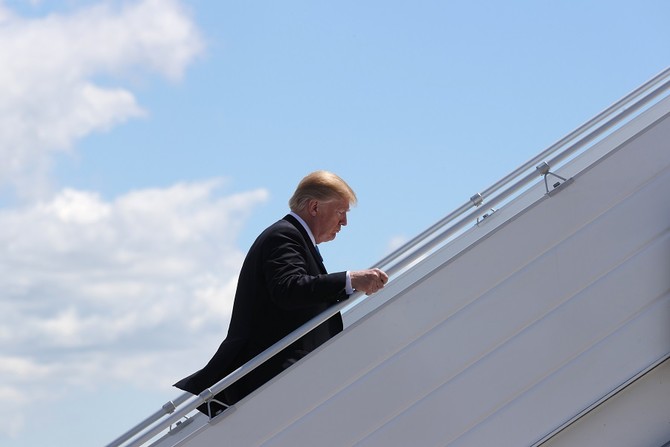
- Trump delivers a stern warning on trade to foreign countries at the G7 summit, advising trading partners not to retaliate against US tariffs
- Trump injected additional controversy by suggesting the G7 offer a seat at the table to Russia, which was ousted in 2014
IsDB, SFD, Arab Coordination Group join initiative to raise $500m for education initiatives
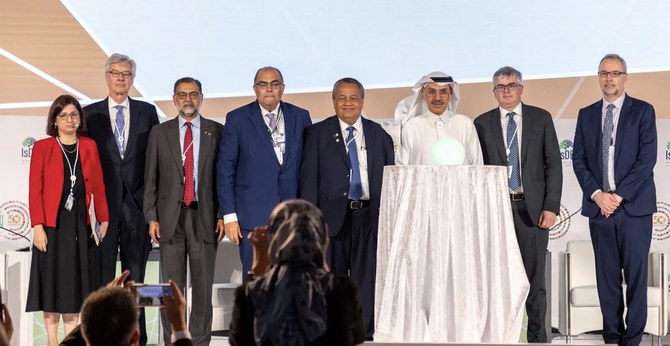
RIYADH: A global partnership involving the Islamic Development Bank will inject $500 million into educational initiatives across member countries of the Organization of the Islamic Cooperation.
During the annual meetings and golden jubilee celebrations of the IsDB, the Arab Coordination Group and the Saudi Fund for Development also joined The Global Partnership for Education, the Saudi Press Agency reported.
The Global Partnership for Education is a multi-stakeholder partnership and funding platform that aims to strengthen education systems in developing countries.
The amount will be raised by the Smart Finance for Education Initiative, an innovative financing tool.
Moreover, partners also pledged an additional $350 million to the initiative, including $150 million from the IsDB, $100 million from the Arab Bank for Economic Development in Africa, and $50 million from The Islamic Solidarity Fund for Development as well as $50 million from the Global Partnership for Education.
The initiative aims to enhance access to quality education in 37 OIC member countries, where 28 million children are without schooling.
Also at the event, the Islamic Corporation for the Insurance of Investment and Export Credit, a member of the IsDB concerned with providing Shariah-compliant insurance services, signed a retakaful agreement for a percentage of the shares allocated to Indonesia for the benefit of the country’s Eximbank.
A retakaful agreement is an Islamic reinsurance contract where takaful operators transfer a portion of their risk to a retakaful operator in compliance with Shariah principles.
The arrangement aims to provide strategic expertise and capabilities in the field of retakaful through a quota-sharing treaty specifically designed to support the launch of the financial institution’s new export credit takaful program product.
This comes as the business expected to be insured under this treaty is estimated at a value of $13 million during the year 2024.
During the IsDB annual meetings and jubilee celebrations, the bank’s president, Mohammed Sulaiman Al-Jasser, confirmed that the entity has designed a strategy for eco-conscious growth and low carbon reduction by supporting members to reach the zero-carbon goal.
Al-Jasser also pointed out that 40 of the bank’s projects are about renewable energy, green projects, and financing climate action.
He underlined the bank’s focus on green initiatives and sustainable development sukuk, indicating they are compatible with the Capital Markets Union standard.
The IsDB’s 2024 annual meetings are being held under the patronage of King Salman bin Abdulaziz in Riyadh from April 27 - 30.
The annual sessions coincide with IsDB’s golden jubilee, as the institution celebrates 50 years of promoting economic and social development in 57 member nations under the slogan “Taking pride in our past, shaping our future: authenticity, solidarity, and prosperity" reflecting the bank’s legacy and future goals.
Closing Bell: TASI closes in green; Saudi banks profits up
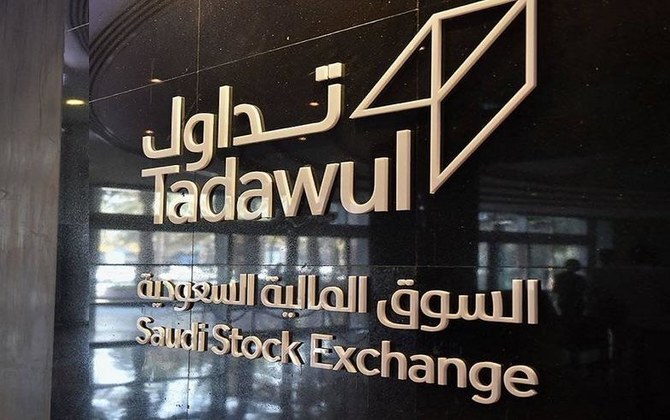
RIYADH: Saudi Arabia’s Tadawul All Share Index wrapped up Monday’s trading session at 12,369.46 points, witnessing an increase of 137.92 points, or 1.13 percent.
The parallel market, Nomu, ended the day at 26,227.72 points, shedding 3.11 points or 0.01 percent.
Conversely, the MSCI Tadawul Index grew by 24.35 points to close at 1,569.81, a 1.58 percent increase.
TASI reported a trading volume of SR8.2 billion ($2.19 billion), with 165 stocks making gains and 63 witnessing declines.
Nomu, on the other hand, saw a trading volume of SR52 million.
On the announcement front, Al Rajhi Bank reported an increase in profits to SR4.4 billion for the first quarter of 2024, reflecting a 6 percent rise from SR4.1 billion recorded during the corresponding period in 2023.
The bank primarily attributed this growth to a 10.2 percent increase in net income from financing and investment activities, driven by a rise in total income on financing and investment.
This was further supported by an increase in total returns on these investments, according to a bourse filing.
Its operational income also saw a healthy increase, rising by 6.6 percent due to gains in net financing and investment income alongside income from other operations.
However, these gains were partially offset by a decrease in income from banking service fees and foreign currency exchange activities.
On the expenditure side, total operating expenses, including provisions for credit losses, rose by 7.2 percent. This increase was largely due to higher depreciation costs and employee salaries and benefits.
Despite these rising costs, the bank managed to mitigate some financial pressures with a reduction in other general and administrative expenses. Notably, provisions for credit losses escalated significantly, from SR359 million in the previous year to SR421 million in 2024, reflecting a 17.3 percent increase.
Furthermore, Bank Albilad also saw an increase in profits as it released its first quarter results.
The bank reported a 15 percent increase in profits, reaching SR643.1 million up from SR559.9 million in the same quarter of the previous year, according to a bourse filing.
The increase in profits was primarily attributed to a robust performance in its investment and financing assets, which saw a 21 percent increase in income.
This significant growth in asset income helped offset the 54 percent rise in the return on deposits and financial liabilities, underlining the bank’s effective management of its asset portfolio against rising costs.
Additionally, Saudi National Bank also managed to secure an increase in profits in the first quarter. The bank reported a marginal rise in its profits to SR5.04 billion from SR5.02 billion during the same period last year.
This modest increase in profits was underpinned by a significant 21.9 percent rise in special commission income, driven largely by growth in the bank’s financing and investment portfolios, coupled with rising interest rates.
The bank also experienced a slight 0.4 percent increase in net income attributable to shareholders, buoyed by a 2.4 percent improvement in total operating income and gains from other non-operational financial activities.
However, petrochemical company Saudi Kayan reported a loss in its first quarter results. Despite the ongoing challenges, the company managed to reduce its losses to SR571.9 million from SR673.3 million in the same quarter the previous year.
Saudi Kayan attributed the narrowed losses primarily to an increase in revenues, spurred by higher sales volumes, which helped counterbalance the impact of lower average product selling prices.
In a Tadawul filing, the company noted that while the average selling prices had decreased, the overall financial performance improved compared to the previous year.
Saudi Aramco retains its status as Middle East’s most valuable brand
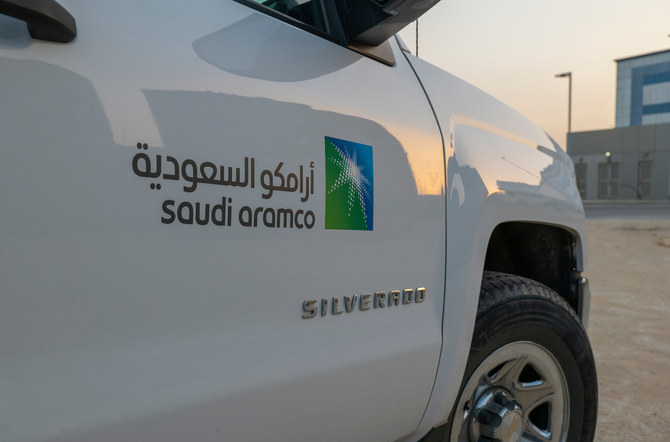
RIYADH: Energy giant Saudi Aramco has maintained its position as the Middle East’s most valuable brand, with a value of $41.5 billion, according to a report.
The latest analysis by Brand Finance revealed the firm continued to dominate the region despite an 8 percent drop in value, driven by a fall in crude oil prices and lower sales volumes.
The report noted that a 12 percent increase in brand value to $13.9 billion meant the Kingdom’s telecommunications firm stc was ranked as the second most valuable in the Middle East and the region’s most sought-after telecom company.
Andrew Campbell, managing director of Brand Finance in the Middle East, said that stc is steadily progressing as one of the leading telecommunications firms globally.
“While Aramco remains the dominant player in terms of brand value in Saudi Arabia, stc’s strategic acumen, characterized by ongoing diversification and digital transformation, have further solidified the brand’s status as Saudi Arabia’s strongest brand, while also positioning it among the world’s leading telecoms brands,” said Campbell.
The report noted that stc encompassed “an integrated system of subsidiaries specialized across sectors, alongside its traditional telecommunications services.”
It add that the company’s acquisition of an interest in Telefonica “marks another key milestone in stc’s growth journey.” said Brand Finance.
With a brand value of $6.4 billion, Al Rajhi Bank became the third most valuable firm in the Kingdom.
Saudi Basic Industries Corp. and Saudi National Bank were ranked fourth and fifth, respectively, with values totaling $4.9 billion and $4.5 billion, respectively.
Saudi Arabia’s King Faisal Specialist Hospital & Research Center, with a value of $1.5 billion, became the Middle East’s most valuable Healthcare label, the report added.
In the UAE, Abu Dhabi National Oil Co. was named the most valuable brand, with a value of $15.2 billion.
On the other hand, Qatar National Bank was ranked the top-rated brand among Qatari firms, with a value of $8.4 billion.
Islamic finance industry projected to grow in 2024-2025
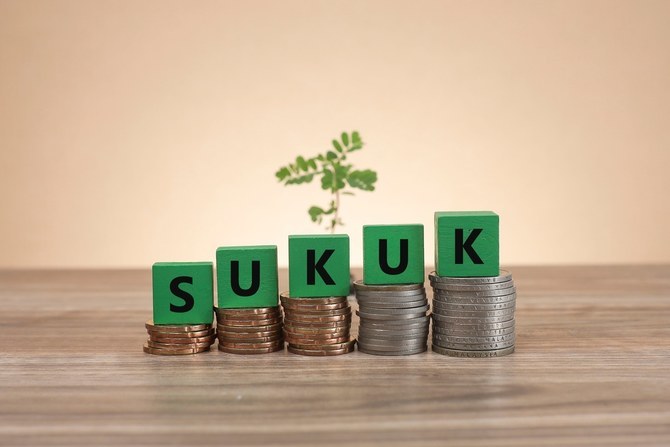
RIYADH: The Islamic finance industry is projected to grow globally in 2024-2025 with total assets likely to witness single-digit growth driven by economic diversification efforts, a report said.
It predicted that sukuk issuance globally would hover between $160 billion and $170 billion in 2024, representing a steady momentum from $168.4 billion in 2023 to $179.4 billion in 2022.
In its latest analysis, credit rating agency S&P Global highlighted that the industry grew by 8 percent and 8.2 percent in 2023 and 2022, respectively, stemming from growth in banking assets and the sukuk industry.
According to the US-based firm, Islamic banking assets grew 56 percent in 2023 compared to 72 percent in 2022.
Financial institutions across the Gulf Cooperation Council region accounted for 86 percent of the reserve increase in 2023, with Saudi Arabia becoming the chief contributor, having generated 56.7 percent of the maturation.
“We expect the implementation of Vision 2030 and growth in corporate and mortgage lending to continue supporting the Islamic finance industry over the next 12-24 months. In addition, the UAE showed a stronger contribution in 2023 thanks to the good performance of the non-oil sector,” the report noted.
It added: “Elsewhere, we observed some growth, particularly in Turkiye and Indonesia. The performance in Malaysia and Turkiye was somewhat tempered by the depreciation of the ringgit and the lira.”
According to the US-based firm, the issuance of this Shariah-compliant debt product began on a strong footing in 2024, with Saudi Arabia becoming a key contributor to the performance.
“The drop in issuance volumes in 2023, which mainly resulted from tighter liquidity conditions in Saudi Arabia’s banking system and Indonesia’s lower fiscal deficit, was somewhat compensated by an increase in foreign currency-denominated sukuk issuance,” S&P Global said in the report.
It added: “The market has started 2024 on a strong footing, with total issuance reaching $46.8 billion at March 31, 2024, compared with $38.2 billion at March 31, 2023.”
The analysis highlighted that the sukuk market will continue its growth momentum in the near term as financing needs in core Islamic finance countries remain high, given ongoing economic transformation programs, especially in countries like Saudi Arabia.
“We expect the sukuk market to fill in some of these needs. Specifically, we see some opportunities in the structured finance space with banks tapping the sukuk market to refinance their sizable mortgage books,” said the agency in the report.
The agency highlighted that the drive for digitalization and sustainability initiatives have yielded mixed results in the Islamic finance industry.
“While opportunities related to sustainable finance are significant as the industry is concentrated in oil exporting countries, progress has been relatively slow and limited in the global context,” according to S&P Global.
However, the report noted that digitalization has helped the banking side of the industry.
S&P Global concluded the study by saying that the future of Islamic finance is sustainable, collaborative, and digital.
“It is sustainable thanks to the alignment between Shariah principles, overarching pillars of sustainability, and the value proposition of Islamic finance that capture more than just financial objectives,” said the report.
According to the analysis, the future of Islamic finance is collaborative because stakeholders do not want to disrupt the industry equilibrium and erase the development achieved over the past 50 years.
The report added that digitalization will also impact Islamic finance in the coming years, as leveraging emerging technologies could help the industry enhance its efficiency and ultimately increase its value proposition for investors and issuers.
Earlier this month, another report released by Fitch Ratings noted that global outstanding sukuk expanded 10 percent year on year to reach $867 million at the end of the first quarter of 2024.
The credit rating agency attributed the growth of this Islamic debt product to funding and refinancing needs, and the development of the debt capital market in the GCC region.
The report, however, added that new Shariah requirements that could alter credit risk, geopolitical uncertainties and high oil prices, could affect the growth of the sukuk market this year.
Saudi Aramco is looking at investment in new energies outside of the Kingdom, CEO says
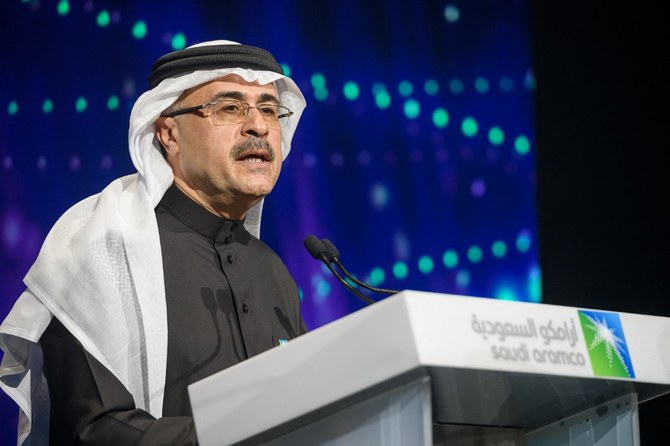
DUBAI: Saudi Arabia’s state-oil giant Aramco is looking at investments right now in new energies outside of the Kingdom, CEO Amin Nasser said on Monday at the sidelines of a World Economic Forum special meeting held in Riyadh.







